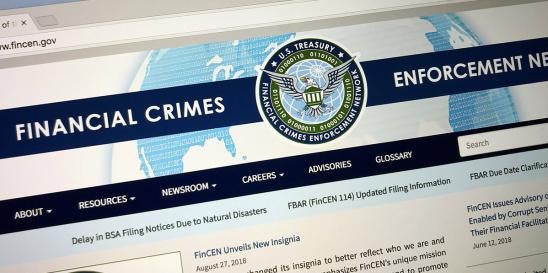Pursuant to the Corporate Transparency Act (CTA), certain “Regulated Entities” must now file information concerning their beneficial ownership information (BOI) with the Financial Crimes Enforcement Network (FinCEN) so that the data can be accessed by law enforcement, the IRS, certain other agencies, and select financial services companies in a new federal government database called Beneficial Ownership Secure System (BOSS).
These mandated disclosure provisions came into effect on Jan. 1, 2024, and require both newly formed and previously established companies, large and small — but mainly small — to provide certain information to FinCEN. That information includes data detailing: (1) Beneficial Ownership and (2) Company Applicants.
Importantly, reporting companies created or registered to do business before Jan. 1, 2024, have additional time — until Jan. 1, 2025 — to file their initial BOI report with FinCEN. However, reporting companies created or registered to do business in 2024, are required to file their initial BOI report with FinCEN within 90 calendar days after receiving actual or public notice that its creation or registration is effective. Furthermore, reporting companies created or registered to do business on or after Jan. 1, 2025, are required to file their initial BOI report with FinCEN within 30 calendar days after receiving actual or public notice that its creation or registration is effective.
To assist entities in working through these complex provisions in an organized manner, FinCEN has released a “Small Entity Compliance Guide” available at: https://www.fincen.gov/boi/small-entity-compliance-guide and has also published a list of FAQs available at https://www.fincen.gov/boi-faqs.
What types of entities are covered?
There are two distinct categories of reporting companies that must now file BOI reports with FinCEN: domestic reporting companies and foreign reporting companies. Together, these categories are intended to capture all manner of legal entities created or registered to do business in the United States, including corporations, LLCs, LLPs, LLLPs, partnerships, certain types of trusts, and any other type of entity that is registrable with a secretary of state’s office.
- A domestic reporting company is any entity that is a corporation, limited liability company, or other entity that is created by the filing of a document with a secretary of state or similar office of a jurisdiction under the law of a state or Native American tribe.
- A foreign reporting company is any entity that is a corporation, limited liability company, or other entity that is formed under the law of a foreign country and registered to do business in any state or tribal jurisdiction by the filing of a document with a secretary of state or any similar office under the law of a state or Native American tribe.
Note, however, there are certain specific exemptions from the definition of reporting company under the CTA, which are covered below.
What are the applicable exemptions?
There are 23 specific exemptions from the definition of reporting company under the CTA.
These exemptions cover larger, generally more seasoned or highly regulated types of entities, including public companies; large private companies; public accounting firms; regulated insurance companies; registered investment companies and advisors; registered venture capital fund advisors; banks, broker-dealers, and exchanges; regulated public utilities; as well as certain tax-exempt entities.
Note that this list is not exhaustive but very high-level and that the lines as to whether an entity is exempt or not are nuanced. Please reference the checklists contained in the Small Entity Compliance Guide for further information.
Our expectation is that many larger private companies (meaning, an entity with more than 20 full-time employees in the United States (no aggregation), an operating presence at a physical office in the United States, and having filed a tax return for the previous year showing more than $5 million of gross receipts or sales from U.S. sources) and their controlled or wholly-owned subsidiaries will qualify for exemption from the reporting requirements, but all entities should reference the applicable FinCEN checklists to verify compliance.
A company does not need to report to FinCEN that it is exempt from the reporting requirements if it has always been exempt. However, a company that previously filed a BOI report and later qualifies for an exemption should file an updated BOI report to indicate that it is newly exempt from the reporting requirements. Similarly, an exempt entity that ceases to qualify for an exemption must file a BOI report within 30 days after the date that it no longer meets the criteria for any exemption.
How is a “Beneficial Owner” defined?
The rule describes a “beneficial owner” as any individual who, directly or indirectly, meets at least one of two criteria: (1) exercising substantial control over the reporting company; or (2) owning or controlling at least 25% of the ownership interest of the reporting company.
As a result, individuals that either: (i) exercise substantial control (directly or indirectly) over a reporting company, or (ii) own (directly or indirectly) at least 25% of the ownership interest of a reporting company, are considered a Beneficial Owner for purposes of the CTA and their identity is required to be disclosed in the company’s BOI report.
The rule further defines the terms “substantial control” and “ownership interest” and describes rules for determining whether an individual owns or controls 25% of the ownership interests of a reporting company.
“Substantial control,” broadly, is defined to include areas such as: (1) a reporting company’s senior officers (e.g., president, CEO, CFO, COO, GC); (2) persons with authority to appoint or remove such officers or a majority of the entity’s board (or similar body); (3) persons with authority to influence important decisions made by the reporting company, including corporate transactions, major expenditures, equity issuances, executive compensation, or entry into or termination of material contracts; or (4) those persons with any other form of substantial control over the company.
“Ownership interest,” broadly, is defined to include: (1) any forms of equity, stock or similar instruments; (2) any profits interests; (3) any instruments convertible into items 1 or 2, or warrants for interests described in items 1 or 2; (4) any options to buy or sell any of the items described in items 1, 2, or 3; or (5) any other arrangement, understanding, relationship, or mechanism used to establish ownership.
Beneficial owners may also include individuals (1) that hold ownership interests in a reporting company through a trust or similar arrangement as well as those (2) owning or controlling one or more intermediate entities that separately or collectively own or control ownership interests of a reporting company.
Who is a “Company Applicant”?
FinCEN’s interpretive guidance provides that only reporting companies created or registered on or after Jan. 1, 2024, need to report their company applicants. A company that must report its company applicants will have only up to two individuals who can qualify as company applicants: (1) the individual who directly files the document that creates or registers the company; and (2) if one or more person is involved in the filing, the individuals who are primarily responsible for directing or controlling the filing.
What is the timing of reports?
The time at which a required report is due depends on: (1) when the reporting company was created or registered; and (2) whether the report is an initial report, an updated report providing new information, or a report correcting erroneous information in a previous report.
Initial BOI report timing
Domestic reporting companies created, or foreign reporting companies registered to do business, in the United States before Jan. 1, 2024, have until Jan. 1, 2025, to file their initial BOI report with FinCEN.
Domestic reporting companies created, or foreign reporting companies registered to do business, in the United States for the first time in 2024, are required to file their initial BOI report with FinCEN within 90 calendar days after receiving actual or public notice that its creation or registration is effective.
Domestic reporting companies created, or foreign reporting companies registered to do business, in the United States after Jan. 1, 2025, are required to file their initial BOI report with FinCEN within 30 calendar days after receiving actual or public notice that its creation or registration is effective.
Updated report timing due to change in information
If there is a change in the information previously reported to FinCEN under these regulations, reporting companies would have 30 calendar days to file an updated report. Examples of changes that would require an updated BOI report include:
- Changes to the information reported for the reporting company, such as registering a new DBA.
- Change in beneficial owners, such as a new executive officer, a sale that changes who meets the ownership interest threshold of 25%, or the death of a beneficial owner.
- Change to a beneficial owner’s name, address, or unique identifying number provided in a BOI report.
It should be noted that FinCEN does not require an updated filing in the event of a company’s termination or dissolution.
Correcting an inaccurate report
FinCEN understands that these are new requirements. As a result, a company that corrects a mistake or omission within 90 days of the deadline for the original report may avoid being penalized. However, companies that disregard beneficial ownership information reporting obligations may face civil and/or criminal penalties.
What type of information is required to be provided?
The reporting company must identify itself, including providing information regarding its legal name, any trade names, current street address of principal place of business, formation jurisdiction, and tax identification number.
The reporting company must also submit information to FinCEN about each Beneficial Owner (as determined in accordance with guidance) and company applicant (if formed after Jan. 1, 2024). This includes:
- The name, date of birth, and address of each beneficial owner and company applicant.
- Identifying number from an acceptable identification document (e.g., non-expired U.S. driver’s license or passport), and the name of the issuing jurisdiction.
- An image of the approved identifying document proving the veracity of that information, among other things.
Conclusion
Corporations, partnerships, limited liability companies, trusts, etc., have historically been creatures of state law with initial formation detail typically maintained by a secretary of state’s office (or equivalent). By adding a mandated federal reporting layer on top of these traditionally state functions, this rule completely changes the ballgame for compliance and recordkeeping purposes, particularly for smaller entities that have not yet invested in robust compliance and recordkeeping functions.
Given the intentionally broad scope of this federal mandate, all impacted companies, regardless of size, should anticipate devoting additional attention to compliance efforts and recordkeeping functions regarding beneficial ownership and other reporting requirements in the coming years to help assure compliance and limit gratuitous disclosure of sensitive information.




 i
i


